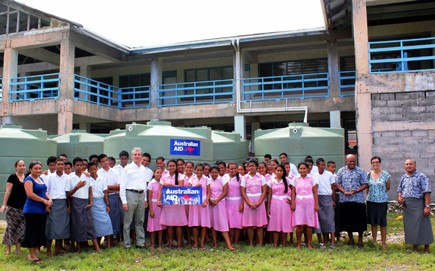Australia is committed to helping the people of Tuvalu meet the challenge of climate change.
At the 2016 Pacific Islands Forum (PIF), Prime Minister Turnbull announced a climate change and resilience support package to the Pacific of $300 million over four years. This is part of the $1 billion climate finance Australia pledged at the 2015 Paris climate change meeting to reduce emissions and build resilience in developing countries over five years.
To take action on climate change Australia's focus is on climate research and information, building resilience to climate change and disasters, and increasing country capacity to respond to disaster events. This support aligns with the Framework for Regional Development in the Pacific, endorsed by Pacific Island Forum leaders, which outlines an integrated approach to addressing climate change and disaster resilience. Australia supports the objectives of Tuvalu's National Strategic Action Plan for Climate Change and Disaster Risk Management.
Key risks and challenges
Tuvalu's group of islands are exposed to cyclones, storm surge and spring tides, all of which are expected to intensify. Tropical Cyclone Pam in 2015, the largest storm to hit Tuvalu in living memory, inundated entire islands, destroyed critical infrastructure and livelihoods and necessitated a major recovery and reconstruction program. The cost to the economy of losses and damage from TC Pam equated to more than 25 per cent of GDP.
Tuvalu's island group sits less than five metres above sea level, making it the world's second lowest-lying country. Sea level rise will compound damage to shorelines sustained during World War II and through recent coastal development. This damage has broken down natural defences. The vast majority of communities live in coastal areas and already experience sea flooding in cyclone and king tide periods, from November-April each year. With projected sea level rise of close to one meter by the end of this century, these communities face extreme risk in the future.
Opportunities
Despite the risks and vulnerabilities opportunities exist in Tuvalu and work is underway to integrate climate risks and resilience into key development sectors.
Tuvalu has achieved stability and important economic reforms and is on track to meet key development indicators for child mortality, maternal health and primary education. These successes will help build the country's broad resilience to a changing climate. Climate change is also a priority area in Te Kakeega III 2016-20, Tuvalu's national sustainable development strategy.
Building capacity to meet climate change challenges
Australia is supporting Tuvalu to meet its international climate change commitments and to access international climate finance by helping build capacity in the country's Climate Change and Disaster Coordination Unit ($0.73 million 2016-20). Our support is helping ensure the Unit is able to effectively meet its objectives and support Tuvalu's climate policy goals.
Bilateral programs
Australia will provide over $4.7 million in climate change support to Tuvalu from 2015-16 to 2017-18.
The current Australian Aid Investment Plan (2016-21) commits to supporting the Government of Tuvalu to strengthen its response to the impacts of climate change and to improve disaster risk preparedness. Key sectors for support include education and governance.
The Funafuti Classroom Building Project ($4.1 million 2015-17) is building school facilities to withstand Category 5 cyclones and to provide emergency shelter.
Technical assistance to the Office of the Prime Minister is supporting Tuvalu meet its Paris commitments. This will build capacities and mechanisms to enable Tuvalu to access global climate finance, including through the Green Climate Fund.
Australia has also responded to Tuvalu's request for assistance on a constitutional review to integrate climate change in the national constitution ($0.5million 2016-19).
Regional programs
Tuvalu benefits from Australia's regional climate change programs, which total over $50 million (2015-16 to 2017-18).
Our programs work to:
- Build capacity of national meteorology services and measure sea level rise through the Climate and Oceans Support Program in the Pacific
- Improve access to and use of climate information for decision making and knowledge management through the iCLIM program
- Support the capacity of Pacific island countries, including Tuvalu, to access climate finance, through the German development organisation GIZ, and
- Provide technical support to integrate climate change across our programs.
Australia also provides support to the Pacific Regional Environment Programme (SPREP), whose mandate includes addressing priority climate change issues.
These programs build on our long-term support for climate science in the Pacific.
Global programs
Tuvalu also benefits from Australian global humanitarian and disaster risk reduction programs.
Australia has committed $5 million to the global Climate Risk and Early Warning Systems (CREWS), which runs a project to strengthen the Regional Specialised Meteorological Centre to provide services to all Pacific island countries.
Australia also contributes to global climate finance mechanisms, including the Green Climate Fund ($200 million committed over four years from 2015) and the Global Environment Facility ($93 million committed, 2014-15 to 2017-18). These funds support a wide range of resilience building and emissions reduction projects in the Pacific region.
Australia uses its seat on the Green Climate Fund Board and the Global Environment Facility Council to streamline processes, highlight the climate change challenges and vulnerability of Pacific island countries and advocate for Pacific focused proposals. In Tuvalu, the GCF has approved a USD36 million coastal adaptation project.

